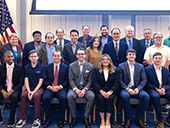Dr. John Dyer Speaks on the Advancement of Technology
This article is over six months old and may reference former titles for DBU faculty or staff, discontinued programs, or other details that have since changed. If you have any questions, please contact us at news@dbu.edu, or (214) 333-5172.

The question sounds like the near-worn premise for many a science fiction novel or Oscar-bait dystopian film: Is there a moral case for artificial intelligence (AI) and for the rapid technological advancement we see around us?
And more specifically, for the Dallas Baptist University audience gathered together at Dr.John Dyer's symposium, is there a biblical case?
Dyer works at Dallas Theological Seminary, having helped develop the program's online education software. He visited DBU to give a symposium speech--titled "Theological Ethics for the Age of Artificial Intelligence"-- at a unique standpoint from that of most the Christian community's kneejerk reactions concerning the rapid advancement of AI.
Some of the questions that arise tend to run the lines of, "Is it interfering with divine creation? Is it man playing God? Are there a Revelations-type indications? If AI has the capacity to rationalize like a human, does it have the spiritual capacity of a human that needs saving?"
Dyer first asked the room to discuss among themselves whether they saw the implications of advancing technology as good, bad or neutral. The majority of the audience indicated a neutral stance, and the consensus between "good" and "bad" was decidedly split. A fitting microcosmic representation of the debate among Christians at large.
However, after hearing a few arguments for every standpoint, Dyer challenged his audience to consider the seemingly radical conclusions he would draw in his talk—specifically, the advent of AI and similar technology a good thing, and it can be considered biblically sound.
"Here's what I want you to come away with," Dyer said, "Technology is good, and it is never neutral under any circumstance. It is always going to have some formative powerful effect on us."
Dyer guided his audience through theological mires by starting at a basic starting point in the Christian faith: the Garden of Eden.
"We were made in God's image," Dyer said. "Part of that image-bearing was to make and create things from what God made. It was built into the creation story from the beginning before sin ever entered the picture."
Dyer went on to include Jesus in the fulfillment of the creation model, having been a maker and creator Himself in the rade of carpentry—a "technology" of its time. Looking forward into the book of Revelations, Dyer argued that the typical vision of a "new heaven and new earth" must be considered in the context of technological advancement, particularly that of AI.
"The portrait of heaven and earth coming down, and a new city being made, is always one of a physical world with physical things: new roads, trumpets, banners...and perhaps even computers and AI," Dyer said.
Dyer called for Christians to help form ethics concerning transparency and accountability in the advent of any impending "explosion" of development on the AI front. At the same time, Dyer challenged the bias many Christian circles of critics that often comes—as Dyer put it—from lack of actual experience with AI, and a lack of acknowledging that AI is something we already interact with every day. "AI use is a tacit knowledge; it's something that has to be experienced. So we need to jump in and realize that to have ethics surrounding these things is going to take a form of embodiment."
Dyer mentioned the Apostle Paul's encouragement in 2 Timothy 4:5 to be "sober-minded" about the world as it changes around us. Dyer also validated the common concerns of Christians who might be reticent to fully embrace AI by acknowledging the implication of some modern thought to "become as close to god-like as possible" through tech advancement.
To attempt reconciling the tech story with the religious story, Dyer distilled his approach in two words: reflection and redemption.
"AI is just another element of human flourishing. It is transformative," Dyer said. "We want to become reflective AI users and participate in the process of creating ethics for it, working against some of the unintended effects. We must be the hands and feet in Jesus in a world that sometimes gets trampled by technology. Humanity cannot be reduced to machines. Saying that does not hamper progress. And yet we can validate that human dignity and worth is far more than our processing capabilities...we all still need to be redeemed by Jesus."
The question "Can robots be saved?" was finally touched on at the last stretch of Dyer's presentation—but only briefly. In keeping with the theme of redeemed creation that unfolded throughout Dyer's presentation, its conclusion touched a ready audience. Robots, AI, computers, virtual assistants and phones are just material things, pieces of creation that are "waiting for redemption."
"They cannot be saved in the way people must be saved, as they're not made in the image of God," Dyer concluded. "But they will be 'saved' as part of all creation being redeemed."
Jordan Jarrett was a member of University Communications at Dallas Baptist University.








